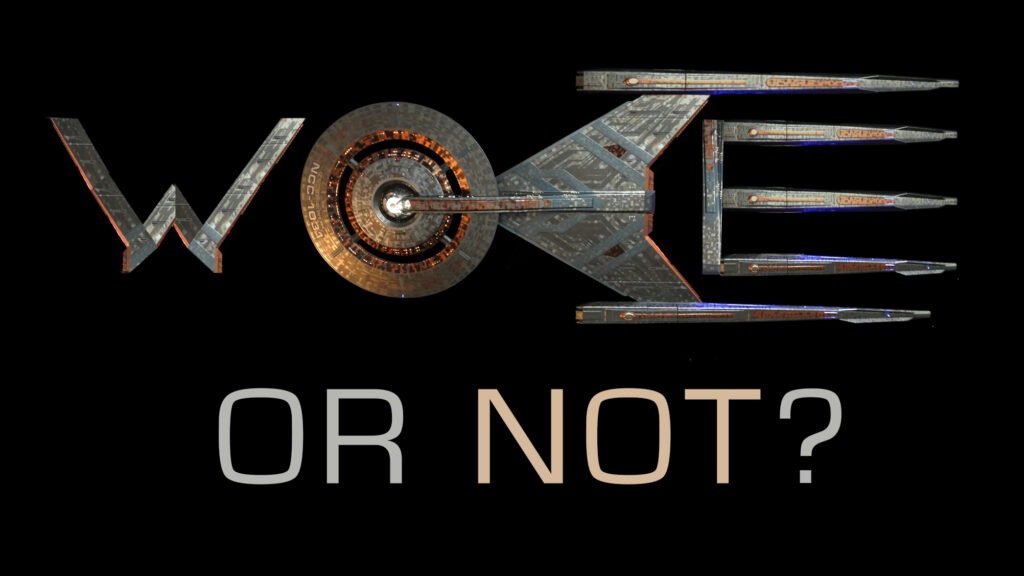
How many times have you seen someone on social media complaining that STAR TREK: DISCOVERY is too “woke”? People seem to use “woke” as though it were some kind of four-letter word!
But what does “woke” actually mean, and more importantly, is Discovery truly “woke”…or do certain people just think that it is?
The word “woke” first came to prominence within the Black community in the 1940s, an African-American slang term that initially meant being informed about systemic racism in America. It was a positive word, indicating awareness of things that tended to be “off the radar” for many Americans at the time.
By 2016, the newly-formed Black Lives Matter movement began to use the phrase and hashtag #StayWoke as a way calling attention to what they maintained was widespread mistreatment of Black suspects by law enforcement. By 2017, the word “woke” was added to the Oxford English Dictionary, defined as “being ‘aware’ or ‘well-informed’ in a political or cultural sense.”
So far, so good. Nothing wrong with being “woke”…yet.
However, like other terms that started out as positive—such as “politically correct” and “social justice warrior”—the word “woke” was eventually corrupted and turned into something derogatory and toxic…specifically by the alt-right and other conservative groups. It became a crass insult directed primarily at liberals and progressives who were ridiculed for everything from “cancel culture” to “critical race theory” in their desire to stand up for what they believed were marginalized and persecuted groups and minorities both within America and beyond.
Gradually, those on the left stopped using “woke” as a positive. Today, even liberals and progressives employ “woke” to call out actions that are mocked for overcompensating in trying to provide fairness and equal representation beyond what seems reasonable and appropriate. One example is the recent trend by the left to introduce the plural word “Latinx” into common usage because because the plural “Latinos” leaves out women (even though Spanish speakers actually prefer the original plural since that’s the way the Spanish language works).
WHAT SPECIFICALLY IS “WOKE” ABOUT ST: DISCOVERY?
Back in May of 2018, as CBS was pushing for Emmy consideration for the premiere season of Star Trek: Discovery, Entertainment Weekly called the new prequel show the “…boldest and most woke series yet.” CBS quickly plastered that pull quote as a headline on Discovery‘s media press kit. Obviously, the word “woke” hadn’t yet fallen from grace.
That was then…
At the time, Entertainment Weekly was calling Discovery “woke” for daring to feature an African-American female lead actress, somewhere Star Trek had not gone before. Now, with LOWER DECKS, we’ve got TWO series with lead actresses who are both Black and female.
But 2018 seems like such a long time ago now, don’t it? Four or five years ago, the casting of Sonequa Martin-Green was still seen as cutting edge and (in an ostensibly good way) “woke.” And of course, there was also the committed homosexual relationship between two central male characters (Paul Stamets and Hugh Culber.) Previous Star Trek series had featured romances and even marriages between various main characters But now Discovery had the first-ever same-sex couple on a Star Trek TV series. Proud to be “woke”—in 2018.
But this is now…
“Woke” has turned into a criticism, even an insult, used by many detractors of the series. But what are they REALLY complaining about? Obviously, the show still features a very diverse cast in terms of race, ethnicity, sexual preference, and gender identity (although not as much as you might think…more on that later). But is that all there is?
Perhaps these viewers feel as though there is overly preachy (liberal?) storytelling that is “woke.” Of course, Star Trek has never shied away from heavy-handed, moralistic scripts with liberal bents. Just look at social commentary episodes of like TOS’ “Let That Be Your Last Battlefield,” TNG‘s “The Outcast,” or DS9‘s “Past Tense“…to name but a few. Each of those episodes tackled a controversial cultural or societal problem directly and without much subtlety. And heck, I’ve seen some people complain about too much hugging makes the series. Is that “woke”? (If so, go binge-watch This Is Us…because you might be wound up a little too tight.)
But seriously, I wanted to understand more specifically what the people complaining about “wokeness” in Star Trek: Discovery were actually having a problem with. So I went to four different Star Trek fan groups on Facebook (this group, this group, this group, and this group) and posted the following…
I'm working on a blog about "WOKE" complaints regarding STAR TREK: DISCOVERY. Without just blindly bashing the series, can you provide any example(s) of how you think the show is "woke" that does NOT (I repeat: NOT!!!) include the races, ethnicities, sexual orientations, and/or gender identities of certain members of the cast? In other words, do "woke" complaints only involve the characters, or are the plots on the show "woke," as well...and if so, how? Also, for extra credit: define "woke."
Perhaps not surprisingly, the discussions quickly turned tribal, with fans either defending or attacking the series and, just as rapidly, attacking each other. Many who defended the show called out those who use the word “woke” as simply trolls and not worthy of attention or response. Even many of those who didn’t like the show said their opinion had nothing to do with “wokeness” and everything to do with bad writing, bad acting, yada-yada-yada. (This isn’t a blog about whether Discovery is good or not, so I won’t dwell on the non-“woke” criticisms.)
Unfortunately, those who did criticize Discovery for “wokeness” tended to be vague about specific examples…
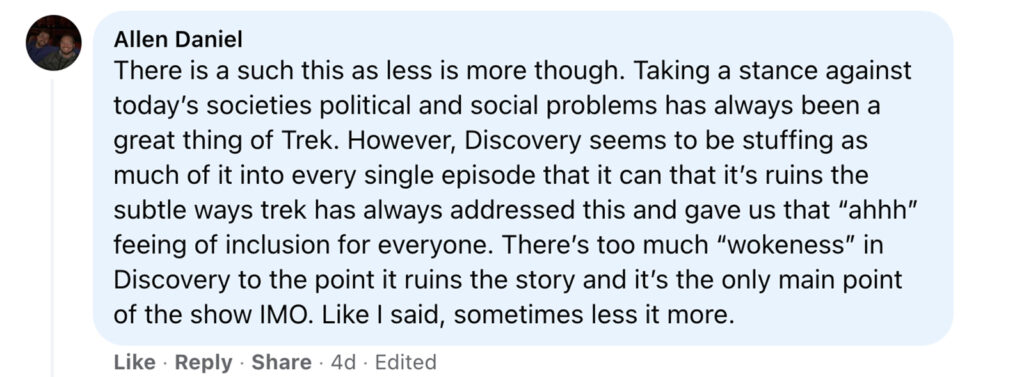
“Every single episode” doesn’t help me zoom in on any specific example(s). Was it “woke” when the crew rescued people on a damaged space station, where they tracked down a rogue Romulan ninja nun, when Tilly leads survivors of a shuttle crash to safety, or when the officers debated whether or not Zora is a sentient A.I.?
Sadly, the only specific examples I received regarding “woke” aspects of the series were somewhat disturbing, like this fellow…
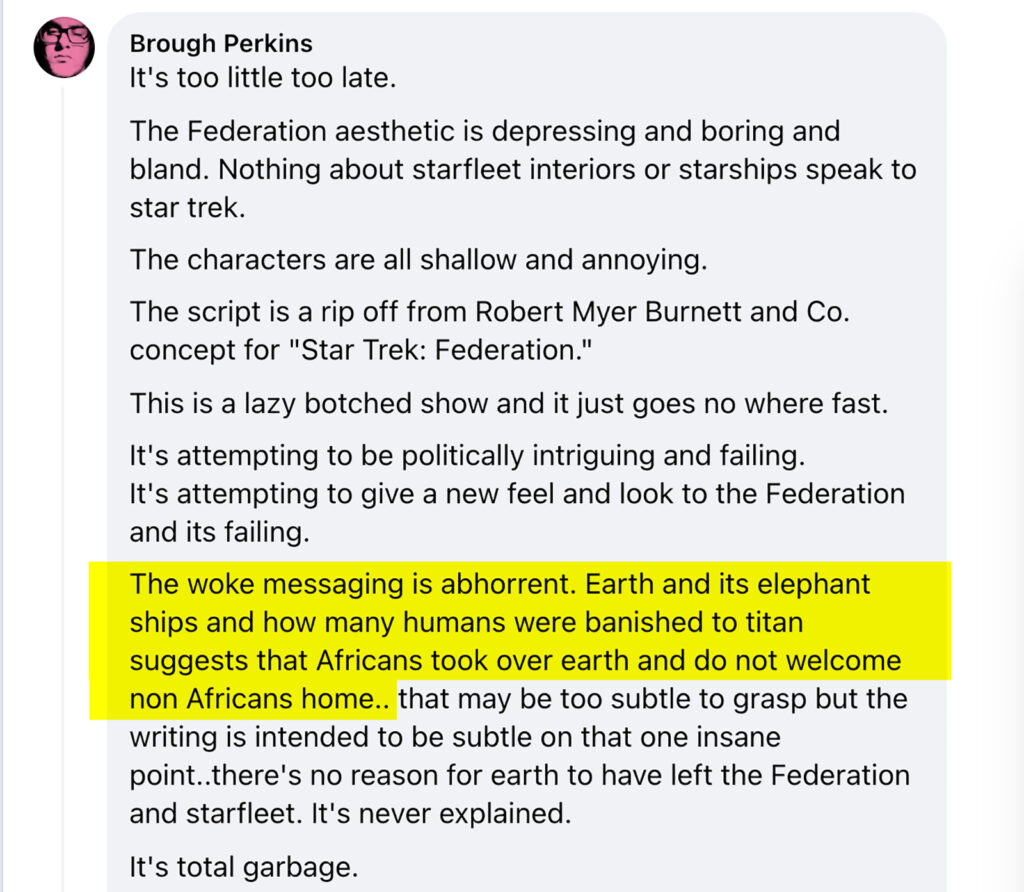
Yep, somebody actually posted that. It was obviously a reference to the early third season Discovery episode “People of Earth.” The leader from Earth who beams aboard in that episode, Captain Ndoye, is Black and likely from Africa (with a name like Ndoye), but the other two Earthers who beam over are both white (including Adira). And of course, in the end, the people of Earth DO welcome the Titan colonists home. However, I will admit that the Earth ships do look strangely like elephants…
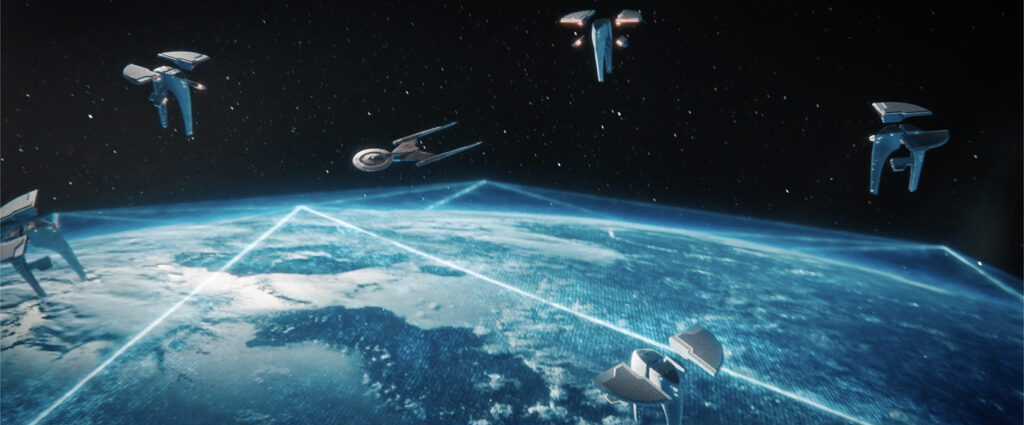
Another person who provided specifics apparently felt that showing kissing on screen was too “woke” (and apparently too liberal, as well). Take a look…
Hmmm, if Michael Rose has a problem with showing people kissing on television, I’m not sure how he got through TOS…
…nor how he got through TNG, DS9, Voyager, and Enterprise…
Even though he doesn’t come right out and say it, I don’t think it’s the kissing in general that is bothering Michael as much as Paul Stamets and Dr. Hugh Culber (two males) kissing. But more on that in Part 2 of this blog editorial. First, we need to ask…
DOES “WOKE” = DIVERSITY?
Without any other specifics out of many, many dozens of responses and comments, I can only assume that it’s not plot lines like the Klingon War, going to the Mirror universe, the Red Angel, evil computer intelligences, the Emerald Chain, or a galaxy-wide explosion of all dilithium that are considered “woke” elements of the show. So that leaves just one thing it can be (other than too much kissing and/or hugging): certain characters’ races, ethnicities, sexual preferences, and gender identities.
And hey, it’s not as though that’s unexpected. The whole origin and evolution of the word “woke” centered around sensitivity to the the often-unfair treatment of marginalized groups…be they Blacks, women, LGBTQIA+, or members of any number of minority races or ethnicities. And of course, Entertainment Weekly called Discovery woke specifically BECAUSE of the diversity of actors and characters.
So it seems as though it’s safe to assume that many of the people complaining these days about Discovery being “woke” are referring primarily to all the racial, ethnic, sexual, and gender diversity on the show. Now, I’m NOT suggesting those detractors are all a bunch of homophobic, racist bigots. While that might be true for some (sadly), others may simply feel as though the diverse characters in Discovery are being featured only for the sake of ticking the boxes of inclusion. Granted, why that would be necessarily be a bad thing still escapes me, but here’s a person whose comment represents that line of thought…
Of course, this brings up a whole other question: is the cast of Discovery REALLY that diverse? You might be surprised when we take a closer look at the racial and ethnic make-up of the actors who have appeared on the series…
DISCOVERY DIVERSITY BY THE NUMBERS
Right now, the eight “main” characters of Discovery are Michael Burnham (Black actor), Cleveland Booker (Black actor), Saru (white actor), Paul Stamets (white actor), Hugh Culber (Puerto Rican actor from New York City), Adira Tal (white actor-Argentine British), Gray (half-Vietnamese/half-white American actor), and I’m still including Sylvia Tilly (white actor). That’s 50% white actors among the main cast, plus two Blacks, one Hispanic, and one half-Asian.
And if you expand the cast to actors who have appeared with speaking roles in at least two episodes, the majority whiteness becomes even more apparent:
Characters played by white actors
- Saru
- Stamets
- Tilly
- Adira
- Lorca
- Detmer
- Ariam
- Nilsson
- Admiral Cornwell
- Harry Mudd
- Ash Tyler/VoQ (actor is of mixed British/Scottish/Pakistani descent)
- L’Rell
- Kol
- Pike
- Spock
- Una (Number One)
- Sarek
- Amanda
- Linus (the actor under all that make-up is a white guy)
- Leland
- Nhan (half Scottish/half Indian, born in Toronto)
- Siranna (Saru’s sister)
- Jett Reno
- Admiral Vance (Israeli actor)
- Dr. Kovich
- Zareh (the first “bad guy” from season three)
- Osyraa (the Orion head of the Emerald Chain)
- Tolor (Osyraa’s nephew)
- Ryn (the Andorian played by Mary Wiseman’s real-life boyfriend Noah Averbach-Katz)
- Aurellio (human scientist for the Emerald Chain confined to a wheelchair)
- Su’Kal
- Eli the E.M.H.
- Federation President Laira Rillak
- President T’Rina of Ni’Var
- Trill Guardian Xi (Greek Canadian)
- Ruon Tarka
That’s 35 white/mostly-white actors cast with either main or at least recurring speaking roles in Discovery so far..21 of whom are male, 13 female, and 1 non-binary. Now, how about other ethnicities…?
Characters played by Black actors
- Michael Burnham
- Book
- Owosekun
- Bryce
- May “the talking mushroom/Tilly’s imaginary friend” Ahearn (maybe Black?)
- Doctor Tracy Pollard
- Gabrielle Burnham (Michael’s mother)
- Earth Captain/General Ndoye
That’s only 8…a quarter of the number of white actors. Here, though, only 2 males and 8 females. Interesting! What about Latino, Asian, and “other”?
Characters played by Latino, Asian and “other” ethnicity actors:
- Dr. Culber
- Gray
- Georgiou (both universes)
- Rhys
- Security Chief Landry (actress Rekha Sharma is of Indian/Fijian descent)
- Aditya Sahil (Federation liaison)
- Kyheem (Book’s brother, Latino actor)
- Lt. Willa (the security chief at Starfleet HQ – unknown ethnicity)
That’s 8…with only 3 Asians, 2 Latinos, 1 Indian, and 1 with parents from India and Fiji. The split here is 5 males and 3 females.
So that’s a total of 35 white actors and 16 non-white actors (or a 2-to-1 margin of whiteness to all other races and ethnicities combined). There’s also 25 males and 22 females…an almost even split with slightly more males.
Still think Discovery is “woke” when it comes to casting ethnically diverse actors and mostly women? The numbers don’t lie, my friends!
Next time, we’re going to look at what makes some people THINK there’s more diversity in the Discovery cast than there really is. Then we’ll move beyond race and ethnicity to what seems to be an even bigger hot button issue: the LGBTQIA+ characters. And finally, we’ll look at swapping out “woke” with an entirely different word that describes the exact same thing but without all the negative connotations. Which word is that? Come back tomorrow to find out…!

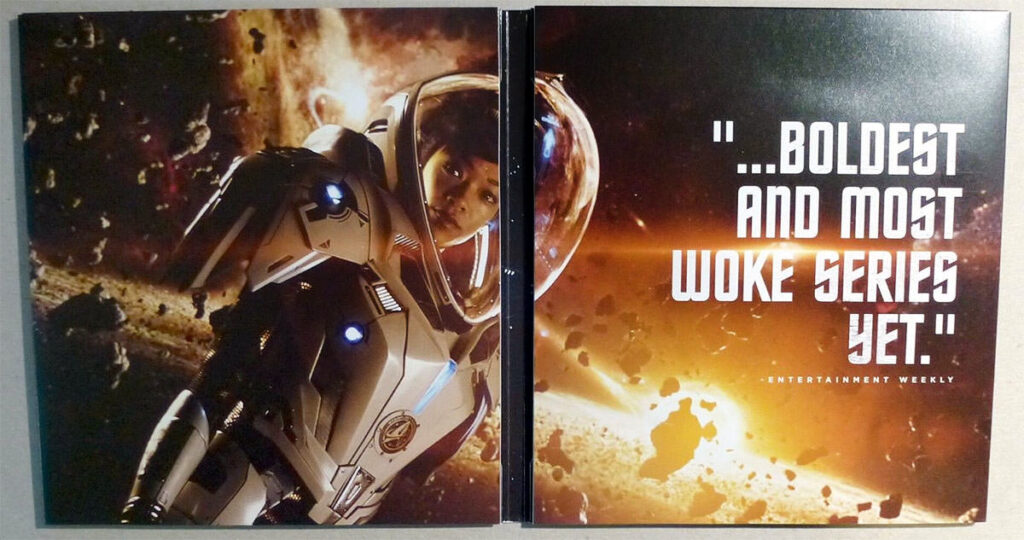
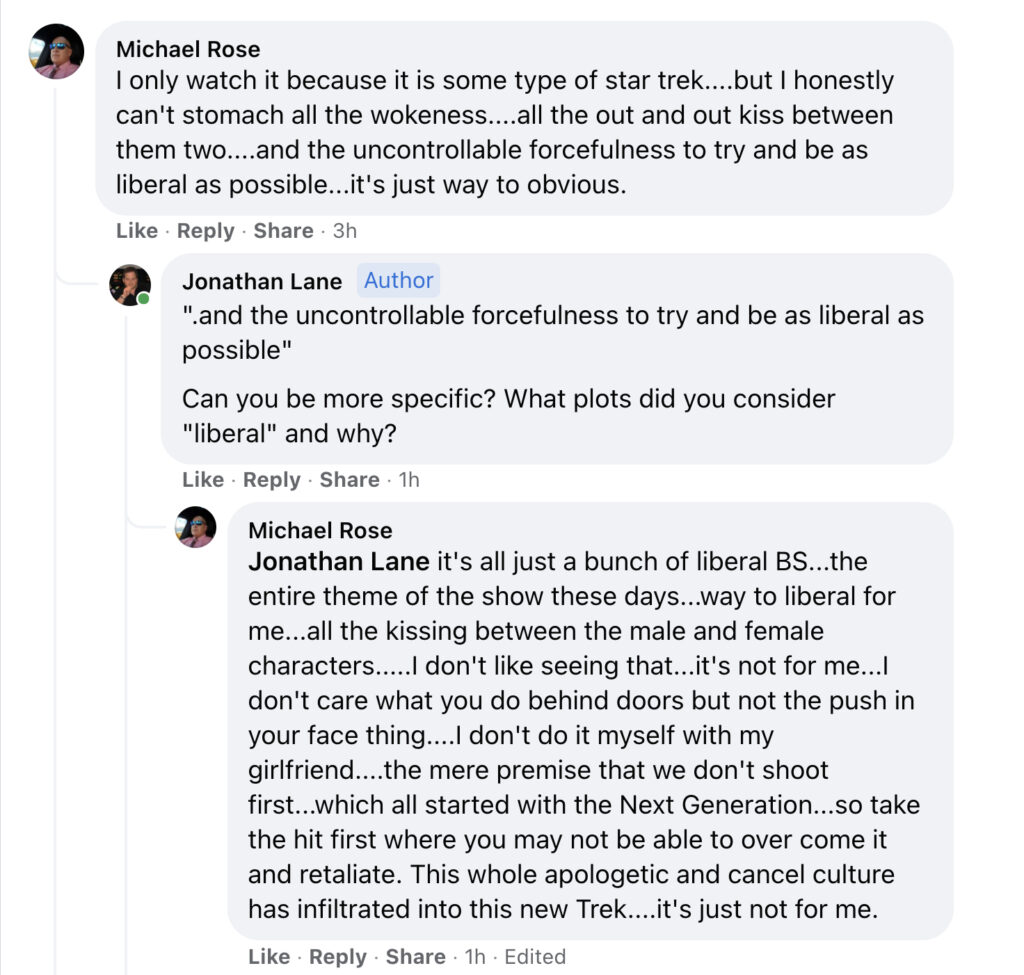
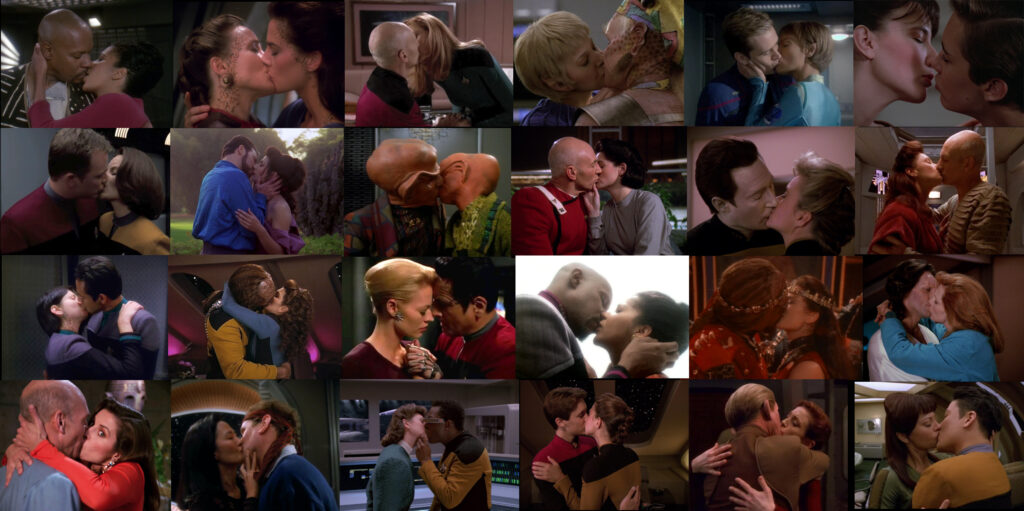
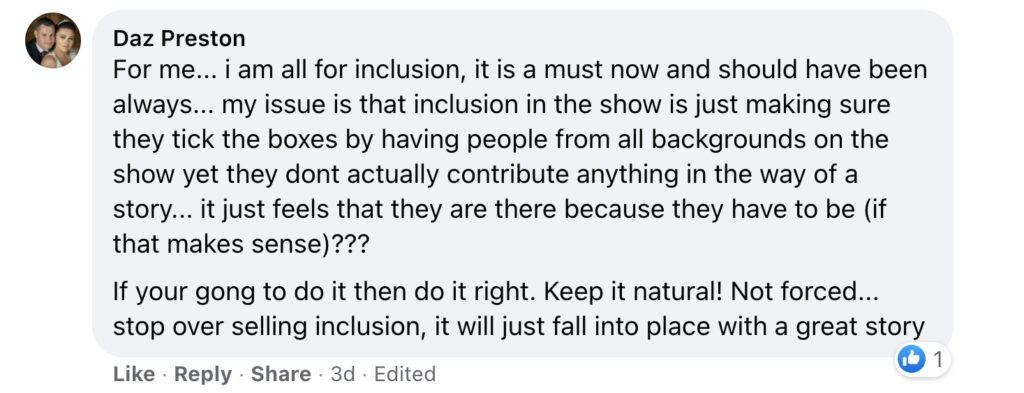
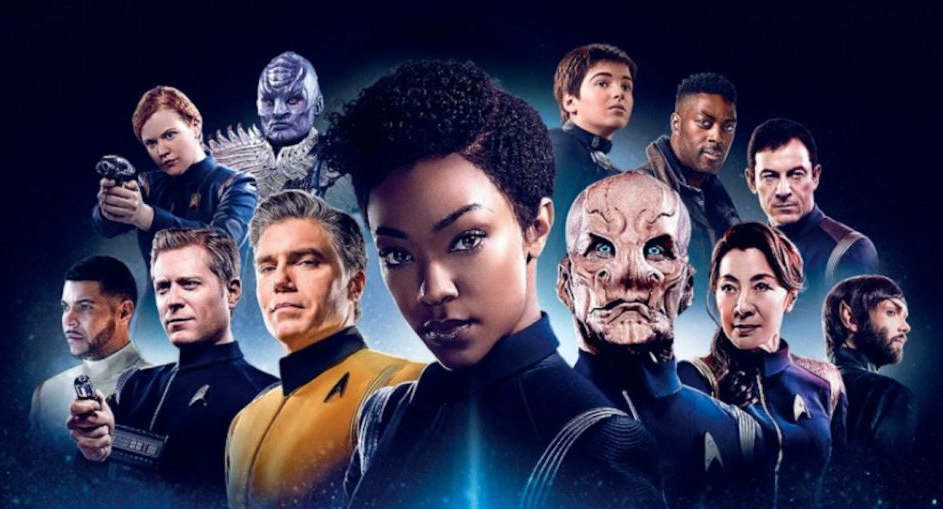
The writing subverts story for diversity in the characters.
In a strange way, given the restrictive environment in which it was created, TOS had to introduce these kinds of concepts with subtlety. You had to slip in minority characters, themes of discrimination, and hint tangentially at hot button topics. The truly ‘shocking’ moments were few and far between, because the network was interested in an action/adventure series, not morality plays. You needed a strong story and the social commentary had to be inserted surreptitiously. Even STNG, Voyager, DS9, and (shudder) Enterprise had to dance around certain topics.
The writers of ST-D aren’t required to be so subtle. The show is at its worst, though, when the writers forget that they need a strong, character driven stories to illustrate the strength of the IDIC aspects of the ST D crew.
When you think of characters, you have to be able to describe a character beyond their diversity label. The writers need to strive to make them truly three dimensional. This gets the audience involved, empathetic, and accepting of the characters. To use a less controversial example, Airem offered them a chance to explore a part human-part machine character. They did almost no character exposition and Airem had almost no meaningful interactions with the crew prior to her death. The writers mistook her designation as a part-human/part-machine as as substitute for character development. C0nsequently, when she died a noble death, the ST D crew seemed extremely saddened but, as part of the audience, it didn’t effect me at all. I wasn’t vested.
I applaud diversity. I applaud social commentary. But these things don’t stand alone. Writers need to get the audience to care. This is done by having strong character development through character driven story telling.
What’s so interesting to me is that Michael Burnham has never said, “Hey, I’m a Black woman.” No plots have ever dealt with her specifically as a person of color. In the same way, no one makes a big deal out of Paul and Hugh being gay (because this is the future and no one cares anymore like they did centuries ago?). And while Adira did, once, ask to be identified with the pronouns they/them, that was it. One scene. Heck, Gray’s character has never been “outed” as trans…beyond the fact that most Trills live in both male and female hosts over their lifetimes.
I can describe each character on the show without including race…whether they are black or white. In fact, you could replace Michael with a white actress or Tilly with a Black actress and have essentially the same character you started with. Does Culber need to be Latino? No. Does he need to be gay? Well, yes, but that is because he is in a committed relationship with another male. In the same way, suddenly turning Michael into a lesbian would negate her previous relationship with Ash Tyler and current one with Book. In the same way, Sarek and Amanda are defined as a straight couple, as are myself’s parents. That’s just part of the story, not part of some political agenda to promote heterosexuality.
Sorry for the late response.
First and foremost, I think it is totally appropriate that ST approaches these issues. Pushing boundries is important and if you can’t do it in science fiction, where can you do it. Gender and sexuality are issues that are as controversial as they are important in today’s society. They do belong on TV. They do belong in ST.
The whole trill concept opens up a lot of possibilities. Even in DS9 where there were no overt LGBTQ characters, Sisko consistently referred to Jadzia Dax as ‘old man’ and then there was the Jadzia Dax/Lenara Khan kiss in ‘Rejoined.’
I’m going to forget the poor choice of actually resurrecting two very important characters (Culber and Gray) who shouldn’t have been killed off in the first place, but the problem is less the relationships and more how they are presented. This season has been better in this respect, but the writers still do a lot more telling rather than showing relationships (and everything else, really). That leaves me with the feeling that they are just highlighting couples in relationships rather than demonstrating the relationships through action. When they do this, it looks as though they are just checking boxes rather than plumbing the depths of a relationship. That’s what people are reacting to.
This is not exclusive to LGBTQ relationships–the Burnham-Ash Tyler relationship was almost inexplicable and abysmally devoid of any actual chemistry. They are doing somewhat better with the Burnham-Book relationship, but, again, there has to be something more to their relationship than she’s good looking/he’s good looking, lets make whoopie.
If you want to be realistic, if you want to change minds, you need to present the characters as three dimensional. Giving the characters complicated back stories, hobbies, and idiosyncratic likes and dislikes doesn’t cut it. You need to show not just tell. The characters are slowly taking shape but are still two dimensional. STTNG had this kind of problem, especially in the first season. ST D gives us more Tasha Yars than Worfs.
This may seem like a strange way to explain it, but take a look at this sketch by John Singer Sargent (https://www.thehistoryofart.org/john-singer-sargent/polly-barnard/). There is not a lot of detail here, but the sketch still seems to capture the essence of the subject. The details are sparse, but your brain sort of completes what the artist left out. You might get an idea of what she is thinking about, what she is wearing, even a feeling about her personality.
They need to stop telling the viewer what to see and think and have the characters live their lives on the screen. If they can do that, viewers will concentrate on the relationship between the characters rather than it is ‘this type’ or ‘that type’ of relationship. Don’t tell us that the relation ship is ‘normal’ show us it is normal.
I think one of the challenges that the writers can escape is the 13-episodes-per-season limit along with the “requirement” that the final two episodes be a blockbuster 2-parter. That doesn’t leave much time to develop characters and relationship while still doing decent sci-fi stories. The previous Trek series had 24 episodes and usually no more than an A and B story (maybe a C story). So you could do a full episode focusing on Worf’s and Jadzia’s growing relationship and then feature them in a B-story a few episodes later. Their love grew naturally. The alternative is the wham-bam-thank-you-ma’am of Worf’s and K’Ehleyr’s two-episode arc. And that one WAS thrown in our faces. Granted, it was two very strong episodes, incredibly well-acted with fantastic chemistry, but we only got to see the tip of the iceberg with their relationship.
Anyway, as I say in part 2 of the blog, Paul and Hugh are giving a lot more to do–especially this season–than just snuggle in their pj’s together. I think a lot of us are missing all the scenes those two characters have that AREN’T romantic or intimate.
The only reason Star Trek exists in the first place is because Roddenberry’s episode of The Lieutenant on race was buried. The only reason shows had to “dance around” certain topics was because of censorship. The less censorship is around the less the science fiction elements of Star Trek are necessary to veil the commentary that has always been Star Trek’s raison d’etre.
Take for example TOS’ “Let That Be Your Last Battlefield.” Aside from the fact that it’s a flawed take on racism, since it boils it down to interpersonal prejudice, because it was written and performed by people who frankly had little direct experience with it themselves, and it’s hampered by the veil necessitated by censorship.
With “Past Tense,” “Far Beyond the Stars,” and “Baddabing Baddabang,” they could get far more direct with their commentary on racism by speaking specifically about real-world racism, and by dissecting all the aspects that comes into play, such the institutional racism still at play, with police brutality, professional discrimination, segregation, uneven medical care, etc., as well as cultural signifiers like Benny Russell’s African objets d’arts, jazz music, doo wop in the street, and Ben Sisko’s civilian clothing.
If anything, Discovery is far less overt in its depictions of the lives of people with different identities. With Captain Georgiou, so far, we’ve mostly just seen Malaysian artifacts in her ready room reflecting Michelle Yeoh’s heritage and pretty much just the fact that Stamets, Culber, Reno, and Adira are out of the closet with their identities.
Lol Jonathan! Let me tell you why you don’t get it. “diverse characters in Discovery are being featured only for the sake of ticking the boxes of inclusion. Granted, why that would be necessarily be a bad thing still escapes me” ,
it’s all Hollywood does these days. Identity politics and Political correctness, crammed into every show, movie, article, etc. And as the great Dennis Prager says so often,
“The Left completely lacks any self awareness” and that my friend, is why you don’t get it. Stop drinking the Kool aid, it’s poison, don’t you realize?
Yet another person who provides no specifics. When I look at Michael Burnham and Cleveland Booker, I don’t see either of them as Black in order to make some kind of political statement. Heck, Book isn’t even from Earth and Michael grew up on Vulcan where racism as a Black/white thing was never a thing. There’s simply two characters on the show with darn skin the same way that Paul and Tilly and Adira have white skin and Saru has a huge head and is really tall and skinny.
The fact is that Discovery doesn’t make a big deal out of it, David, and neither do I. But for some reason, you do. I wonder why that is…and if you’ve noticed any after-taste to the Kool Aid you’ve been guzzling. 🙂
It’s interesting to me as a Canadian how Americans can seem to insert their personal partisan politics into a fictional show. A serious question i’d have for you though is what makes this specific outing more woke or left wing or whatever than any of the others?
My father had to deal with folks like you when Voyager and Deep Space Nine came out, heck he even remembers the no man vs no one controversy on TNG. With DS9 his one would always complain to him about the casting of captain Sisko. Always careful to say “well it’s cause i don’t like Avery Brooks, nothing to do with his colour”…..suspiciously though this same friend also seemed to have a major issue with Tuvok being black about two years later. “There are no black vulcans” he would say. To which my dad would simply respond “Eta Eridani is a binary star system it’s actually a wonder how there could be any white vulcans” which usually ended the conversation because his friend would get all flustered and offended and kept saying “i’m not racist i swear”
You see, people to the right of Attila the Hun have always hated and been offended by Star Trek. That’s the point! Gene Roddenberry was very clear he was demonstrating how humanity PROGRESS, not how insular and conservative we would become.
I’m not gonna tell you you shouldn’t like Star Trek but maybe on your next watch you ought to seriously think about the messaging the episode is trying to impart. You don’t have to agree with it, but just think about it.
Of course the idiot answers are going to stick out because they’re just so damn stupid. But you wouldn’t be writing this article if the problem were just some idiot posts. You’re writing about a general feeling among a lot of fans that’s much larger than just a few idiot posts.
Maybe the reason so many people are bumping on the so-called “wokeness” of Discovery is because it all seems like so much insincere and ham-fisted virtue-signaling — like everything they’re doing is intended primarily to give the series a certain “shine” (for the purpose of marketing) rather than arising, organically, out of the setting and situations. It’s kind of an “Emperors New Clothes” situation where some fans are marveling at the “wonderful wokeness” and other fans feel like they see right through the insincerity.
To me the best way to critique something is to point to another show that does the same thing infinitely better — and that show is “The Expanse.”
The Expanse is more diverse in just about every way than Star Trek Discovery is, and yet no one complains about the Expanse being too woke. Why? Because it doesn’t seem like insincere virtue-signaling but rather like it’s portraying an actual, real, organic world.
How did The Expanse succeed where Discovery failed?
Two reasons, first because it *is* more sincere — the authors of The Expanse aren’t trying to be “woke,” they’re trying to portray the future of humanity as they see it, and being diverse is the natural by-product of that — while the producers of Discovery *are* trying specifically to be woke and they are trying just so damn hard at it.
Second, The Expanse is just so much better written. Sorry, man. I wish it wasn’t true but the writing team on Discovery just can’t hold a candle to the writing team on The Expanse.
The Expanse is the Star Trek of today. Come on over, the water’s fine.
Could it be that neither show is more woke than the other, but because Discovery has more detractors, the word “Woke” is just loaded into the cannon along with every other complaint before the person doing the criticizing yells “fire!”?
Y’see, Dennis, like so many others, you give no specific example of “insincere and ham-fisted virtue-signaling,” as you call it. What specifically—episode and scene—illustrates this? Y’see, I can’t simply say, “Asian drivers are the worst!” And honestly, I shouldn’t even be allowed to point to just that one Asian driver who nearly got into an accident with me last week and say, “See? They’re all like that!” But you aren’t even going that far. You’re simply saying that Asians are bad drivers, and here’s another ethnic group, driving the same cars, and they drive so much better than Asians do. Until I hear some specifics or see a lot more concrete examples, my friend, I’m calling b.s.
“Seems sincere” or “seems insincere” are not arguments. They’re not empirical. They’re feelings. How does one show “seem sincere” and the other “seems insincere?” As Jonathan has said, there’s nothing in either show about prejudice against each other others’ identities. Stamets, Culber, and Reno have explicitly stated that they’re gay, but it was pertinent in context. Adira requested the use of they/them pronouns, but people will always have to do that, even in the most enlightened cultures, unless we all suddenly become telepathic.
The only think I could maybe see is promotion outside the show. But Star Trek has always touted diversity in its casting.
I checked, and Reno has never said that she is gay. Actress Tig Notaro is gay, but the character could still go either way if the writers decide to explore that aspect.
You might’ve caught this already since you mention her as gay in part 2, but in “Through the Valley of Shadows” Reno talks about her wife who died during the war.
Yeah, I fixed that in Part 2.
Anyone who uses “Woke” is not making a serious argument. It’s come to mean anything and everything. Worse than vague, it’s also suffused with racism and homophobia the likes of which should make one hide under a rock.
Do I like Disco? No, but mainly because of the scripts and art direction.
Is Star Trek progressive? Always has been. Always.
Is the casting a little heavy-handed? Yes, but who cares? Grow up.
Well said…although with 2/3 of the actors being white, I’m not sure how you can call the casting “a little heavy-handed.” 🙂
If anything, it roughly approximates the ethnicity mix of the United States.
Kinda. While the white-to-black ratio is close, the “lone Latino” on the show, Wilson Cruz, is under-representing the percentage of Hispanics in America.
But representation in media only reaches parity with the mix in the United States when you take it in the context of characters that have more to say than just “shields to 75%” over the course of the entire franchise. There’s a lot of ground to be made up before it can be called “heavy handed.”
Good point.
Disco is the first Trek without a single (admirable) straight white human male in the regular ensemble (at least in the few eps I sampled.) And the only one we meet…is evil. To me, that’s a bit heavy handed.
Personally, I like shows with diverse casts: Prodigy is great, DS9 is my favorite Trek. I’m sad that Lovecraft Country didn’t get re-upped. Tbh it was the Klingon re-design, set design, lack of pre-TOS Trek-ness, and writing that turned me off of Disco.
What about Ash Tyler (or are you counting him as Klingon)? And in season two…Pike…and Spock. Season three added Admiral Vance as a semi-regular straight white human male.
But let me ask you, Steve, even if none of the characters I just listed existed on the series, why is it “heavy-handed” to not feature an “admirable” straight white human male? Is there some quota that shows are expected to meet when it comes to featuring straight white good-guys? Does the series somehow “fail” if they don’t have enough? If so, why?
the defect of Star Trek in general is to represent the American situation as if it were the world one. the cast would look genuinely inclusive if there was a fair representation of planet earth, not the people of the US. the Expanse works best in this regard. when an actress is Indian she is not a Los Angeles woman of Indian descent. for example there are no Italians (I am Italian). the only ones who seem Italian are obviously Italian Americans who don’t exist in Italy. they are stereotypes of gangster movies. paradoxically, within the limits of its time, TOS looked much more organic. as long as the federation and Starfleet continue to be an allegory of the US they will continue to show its flaws. I’ll give you an example that seems out of context but isn’t. why do the ships have names reminiscent of the Us navy? it is not credible that Starfleet does not have a Uss Einstein (to name one). or any other name unknown in the US but important in the world. not to mention all the important names of the other Federation planets … Star Trek often sins of naivety. since you like to enumerate the characters to demonstrate the level of representation, why not count how many characters are from the US and how many are not? Maybe throughout the franchise. it could stimulate interesting thoughts … Star Trek is a worldwide phenomenon that looks at the navel. however I love Star Trek, I wouldn’t be here to discuss it.
Well, there are certain limitations inherent in casting a television series filmed in Toronto (Discovery) or Vancouver (The Expanse) or Los Angeles (Picard). It isn’t practical to fly an actor from Italy or Japan or India or Brazil just to be on a particular TV series. Actors are, in general, expected to be able to commute easily by car to the production studio. That is why the vast majority of actors on Discovery and The Expanse are either Canadians by citizenship or else live at least part-time in Canada (also helps them get a work permit) while those on Picard live in the Los Angeles area and those on The Walking Dead or many of the Marvel series live (at least part of the year) in Atlanta.
Even Patrick Stewart famously didn’t give up his home in Great Britain after being cast in TNG, expecting the series to last only one season and that he’d be back in the U.K. within a year. And trust me, if the line producer for Discovery or The Expanse was faced with the choice of paying the daily rate of a local actor versus paying extra to fly someone in from Italy or India or whatever and put them up in a local hotel, unless it was a major actor that the director and studio had specifically asked for and budgeted for, the local actor would be cast every single time.
Interestingly, the only Star Trek without a single white *American* human male among the main (opening credits) characters is Deep Space Nine. Even Discovery can’t claim that.
Armin and Rene count as American, human, and male…even though the characters they play are alien. But I know what you were trying to say. 🙂
I did say “characters” rather than “cast members” for a reason, but I probably should’ve pointed that out a little more directly to avoid confusion or misimpressions.
When all is said and done, getting so into the weeds as to try to identify a character as “American” as well as “white” seems a little bit of a stretch. In general, most of these series didn’t really make a big deal of having primarily American Earth characters. TNG only had Riker (Alaska); Beverly was born on a moon colony and Geordi was from Somalia (not sure where Wesley was born). But the rest were all from other planets…aside from Picard, who is from France (and Worf grew up in Russia). Deep Space Nine had only three representatives from Earth in total: Benjamin and Jake, plus Bashir (whose country of birth was never officially established but was likely somewhere in south Asia). Everyone else was from another planet.
So when you think about it, DS9 had twice as many American male characters as TNG. Now, if you want to point out that DS9 gets some distinction because its two American characters are both Black, one might ask why the color of their skin matters as much or more than their country of birth.
Thanks for proving what I wrote earlier Jonathan! For leftist like you, it’s always about race, gender, PC. For the normal people, it’s not about any of that concerning the actual actors! It’s how their characters are portrayed. For instance, Adira, was just a bright young lady, however, she is now telling Stamets & Crew, “my pronouns are ‘they, them’, which in Trek context is explainable, however, it’s every chance writers get, to try & normalize a mental illness of some people in real life, hence, PC garbage. The problem, is, most of us, have tried to have these discussions with leftist, who ultimately end up name calling, because they just don’t understand where we are coming from. As for other examples, there are tons of them. Trek in general has flipped the scrip, like everything Hollywood has been doing, as are other institutions, like media, academia, etc, it’s the the lefts hatred if men. Picard being a prime example. The left has swapped patriarchy for ” matriarchy” and you’re completely oblivious to any of it. Your fall back position is to always attack the messenger, not the message. You on the left call us racist, homophobic, xenophobic, when in reality, it’s the left projecting. You’re not satisfied to let others have their own opinions, no, on the contrary, you think you need to force us to affirm your beliefs, which are not the norm you think it is. Especially since you live in Commifornia, your blue state bubble is thick. You think we are bad people with ideas, we think you are just people with bad ideas. You foster censorship, because you can’t stand to hear opposing ideas, because you can’t defend many of your positions with facts. And your writing this blog, on this subject only proves you just don’t get it. And sadly, it’s highly likely you never will. So, go ahead and insult us, it’s what the left does best. And that should be the bad taste of your Kool aid, since I don’t drink. Lol
I’d simply like to point out that following thing you said:
“…have tried to have these discussions with leftist, who ultimately end up name calling.”
Isn’t “leftist” name-calling? If you disagree, how about your use of the word “Commifornia”?
Only one of us has inserted name-calling into this discussion, my friend…something you might want to think about.
Great article, I learned a little too (always a plus). You went quiet for a week or more after Red Shirts (a long time for you but, hey, everyone deserves a break) so I’m glad to see you back.
My two cents/pence is this all just an excuse for anyone with a beef about Discovery to have another dig. For me, it’s working so much better now as a series. When I cut the same sort of slack that my younger self did for Trek I just accept some of the dodgy plotting/science and enjoy the ride. It’s a lot of fun now.
For me, the only time Star Trek went beyond the pale was putting a Frenchman in charge. Sacre bleu! No, I’m kidding really… Err, no I’m not. Or am I? 🙂
Yeah, I spent much of January taking a bit of a blogging break. The “Red Shirts” article was an “evergreen” I had sitting around. I’ll have a video interview with the folks from Farragut Forward next week, and I’ve got to get some questions written for Glen Wolfe about the latest Federation Files. I’m also waiting for answers from Randy Landers about the last Starship Webster release, but Randy just lost a parent, so I’m not rushing him. Oh, and I’m spending some additional time lately working on the audio version of my Santa Claus book that came out in 2012 and getting some social media tasks done for my two current clients.
Excellent points, Jonathan. I honestly believe people use this (and other equally vague) complaints about Discovery simply because they don’t WANT to like the show. It’s new and slightly alters canon (admittedly in some big ways that require a little suspension of disbelief, such as Spock and family never mentioning such an important family character as Michael in subsequent years…) and it looks different and more “modern” than TOS. (An odd paradox as both shows represent a fictionally envisioned future, but are themselves separated by 50 years of technological advances, largely inspired by the original show’s vision of the future, which have actually helped to make it now seem more dated and old fashioned) As with TNG, (though its spin-off shows maintained its continuity fairly well) then Enterprise, then the Kelvin films, many fans entrenched in the history of the franchise have a difficult time with changes, particularly those that involve adding to or, in some cases, rewriting events from the previous eras of the show’s “canon.”
I believe it requires too much of a stretch of the imagination for some, honestly. If it looks different than TOS or TNG or their related films, they simply cannot accept it as simply a different view of the same stuff. They cannot accept that their memories of the shows and the way the shows were rendered in their time are as dated as the shows themselves. They also can’t accept that the stories should really transcend the look and style of the shows and movies of their generations and that, when the 2200’s and beyond actually do play out in linear time, it’s extremely likely that NONE of the incarnations of Trek will have gotten the look, tone, and technology of the time correct.
As to your original question, I think using “woke” as a criticism is weaker than those critics claim the writing is. Especially with regards to your assertion that “woke” is already a vague term with no real definition. What they’re really saying is they feel that the show(s) from current Trek offerings are trying to root themselves too firmly in today’s divisive politically charged culture. Whether or not that is actually the case, (your analysis seems to make some convincing arguments that it’s the fans making a bigger deal of more politically charged themes they perceive from the shows than the shows themselves do) I think you’ve made an excellent point that using “woke” as a criticism is weak because no one seems to be able to actually point out any specific examples of where they’ve done so.
I will offer one example that suits your definition of “woke” from the historical context of pointing out unequal treatment of minors that pertains to Discovery, though it is not actually contained in any onscreen iterations. Perhaps some apply the term in this fashion because of the cast “taking a knee” in a photo at one point in an early season? I know some folks took some issue with that for whatever reasons. That’s about as close as I can come to an actual applicable example. But that still doesn’t apply to the writing or on-screen presentation of the show itself. But as to the show itself, I don’t really see it as any more or less “woke” or diverse as previous iterations of Trek except perhaps it’s even more accepting and inclusive than others before.
I think “taking a knee” only counts while the U.S. National Anthem is playing at football games, Paul. 🙂
Thanks for sharing your thoughts.
Sigh.
To me this is about prejudice, plain and simple and the name calling on this blog and elsewhere reminds me of “Let This Be Your Last Battlefield”. There are those who are consumed with fear and hatred and are not shy about letting the world know about how they feel with insults and worse.
We’d all be better off if we don’t impute motives to those making casting decisions. If they cast someone because she’s black, his eyes are green or because they speak Spanish, I don’t care. I care that the person selected is a good actor.
I register my opinion by watching or not watching a show (also including plot etc, of course).
But I guess we can’t escape the political civil war these days but just try to endure it until a better day dawns.
Wether or not people talked about Uhura in the 1960s, the push for civil rights would still have happened. But it happened BECAUSE people spoke out rather than just trying to “escape the political civil war.” I wrote this blog in order to speak my peace on the forum that I have. That doesn’t mean that Fan Film Factor will now become political. It simply means that I won’t make the choice to remain silent when I consider there is something important worth discussing.